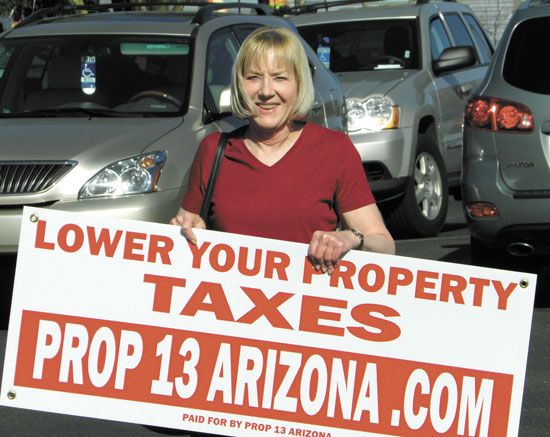BY LINDA BENTLEY | SEPTEMBER 2, 2015
Prop 13 Arizona redux for another ballot run
‘Government’s desire to spend drives the process. Property tax bills have no real relationship to the value of your property.’
PHOENIX – Lynne Weaver, chair of Prop 13 Arizona, an initiative to restructure property taxes and limit increases to no more than 2 percent per year, registered her ballot proposition with the Arizona Secretary of State’s office on Aug. 24.
Weaver needs to collect at least 225,963 valid signatures to place the initiative on the November 2016 ballot.

This will be Weaver’s third attempt to get the proposition, which is based on California’s 1978 initiative that passed with nearly two-thirds of the vote.
Weaver said the language has been revised to eliminate valuation roll-back provisions and other items opponents previously found objectionable.
Prop 13 Arizona phases out business personal property tax over three years, ends the current K-12 school funding formula by eliminating primary and secondary tax designations on which it is built, limits property taxes and caps property tax increases to no more than 2 percent per year.
Weaver points out that Arizona’s property tax system is the most complicated and complex system in the nation and said Arizona is the only state with primary and secondary property taxes.
Under the current system, when valuations decline, Weaver says tax rates automatically rise, ensuring no taxing district receives less revenue than the prior year.
She said passage of Prop 13 Arizona will require a new K-12 school funding formula.
According to Weaver, under the current system, property taxes only go up unless bonds are retired or overrides are allowed to expire.
She said the way it works now, taxing districts decide how much they want to spend, then look at the total value of property in their district, divide one by the other, come up with a tax rate, apply it to your valuation, and send you your part of the bill.
Weaver said, “Government’s desire to spend drives the process. Property tax bills have no real relationship to the value of your property.”
Weaver notes after passage of California’s Prop 13 (People's Initiative to Limit Property Taxation), which reduced tax rates from 3 percent to 1 percent, reduced revenue by 57 percent in the first year, yet all government services continued uninterrupted.
Subsequently, she said, even though residential and business property owners paid a lower tax rate, revenue to Los Angeles County alone actually increased an average of 7.5 percent per year over the past 30 years.
Like the California initiative, Prop 13 Arizona will utilize the current assessed valuation of property until it is sold. When sold, the assessed valuation will be the actual sale price.
Prop 13 Arizona retains the senior valuation freeze option for property owners 65 and older on the property owner’s primary residence, providing they make application by Sept. 1 and meet the income and residency requirements.
For those whose applications are approved, the value of their primary residence shall remain fixed for three years with options to reapply every three years.
Beginning Jan. 1, 2017, Prop 13 Arizona will begin phasing out business personal property tax by reducing the rate by one third in 2017 and one third in 2018. As of Jan 1, 2019, personal property will no longer be subject to taxation.
Weaver says higher property taxes negatively affect the value of homes and, according to the Wall Street Journal, every $100 increase in property taxes reduces a home’s value by $1,200.
The Tax Foundation explains how limiting taxes is instrumental to business decisions and stated, “Taxes matter to business. Business taxes affect business decisions, job creation and retention, plant location, competitiveness, the transparency of the tax system, and the long-term health of a state’s economy. Most importantly taxes diminish profits. If taxes take a larger portion of profits, that cost is passed along to either consumers (through higher prices), employees (through lower wages or fewer jobs), or shareholders (through lower dividends or share value).
Thus, a state with lower tax costs will be more attractive to business investment, and more likely to experience economic growth.”
Visit www.Prop13Arizona.com for more information.


